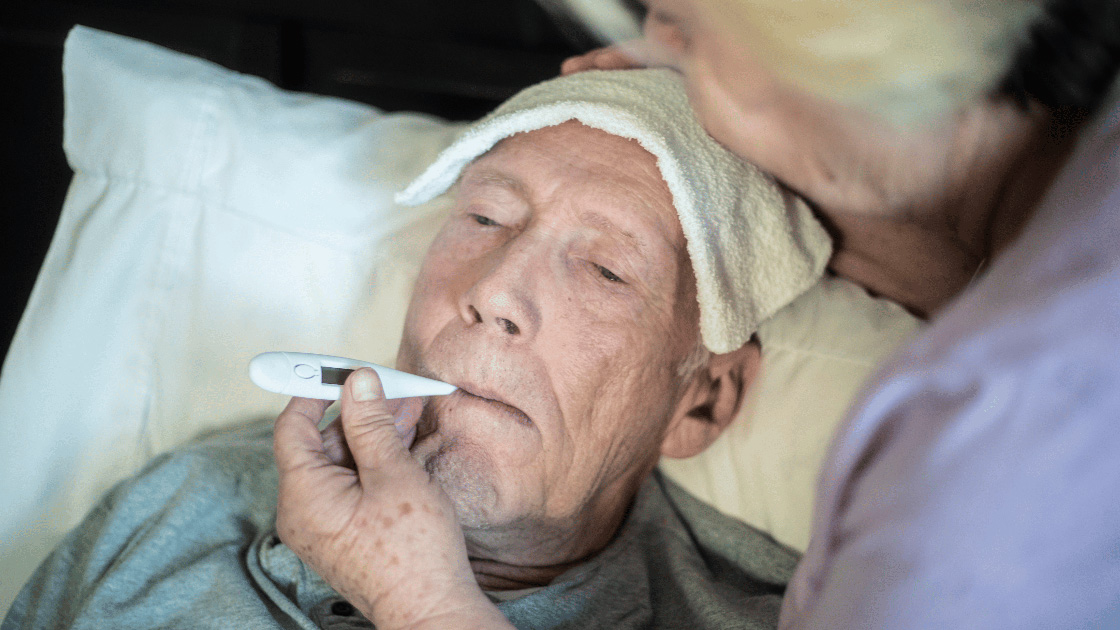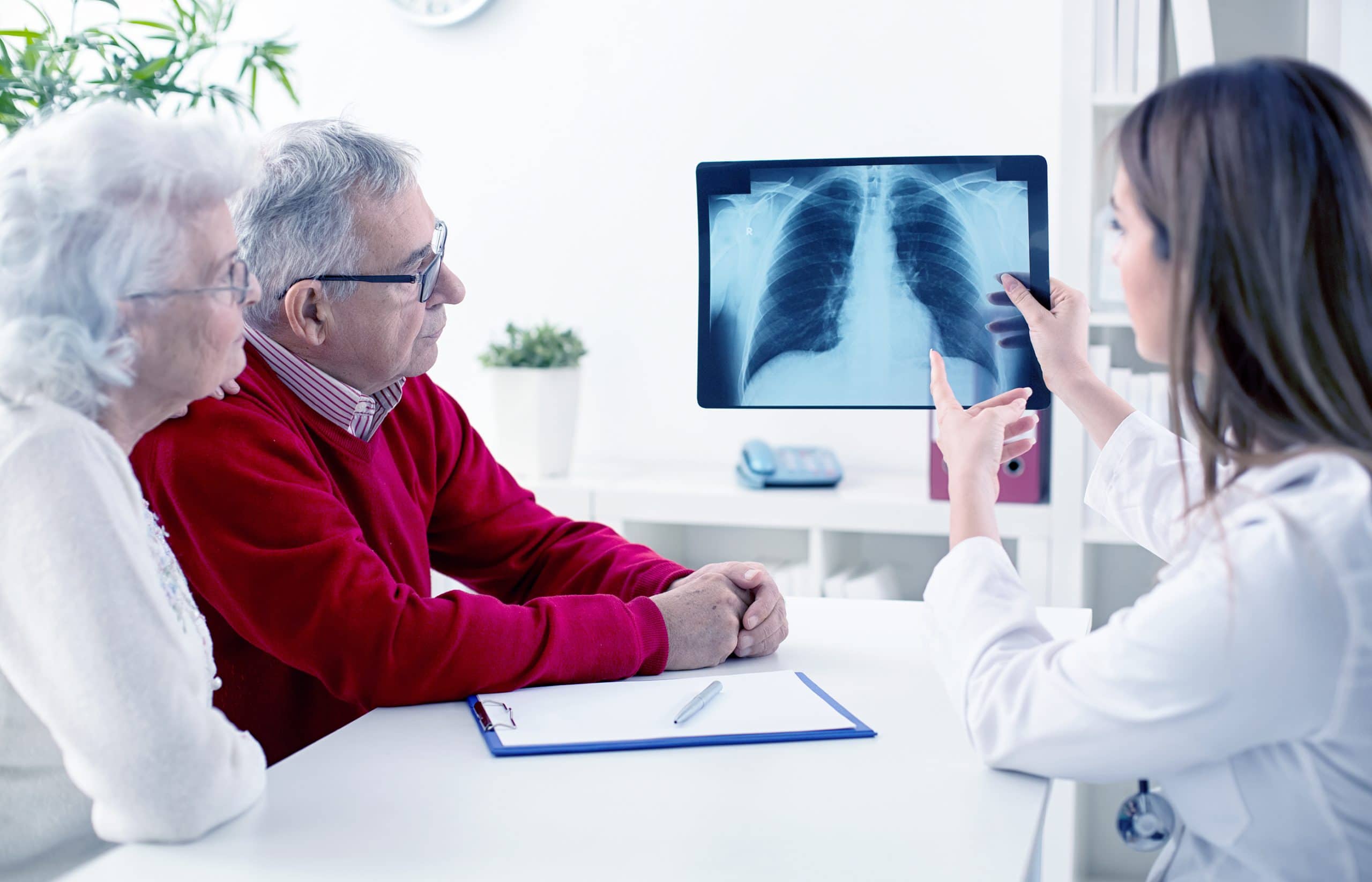Night Sweats and Fever
Lung cancer can cause night sweats and fever symptoms. Learn about the causes of night sweats and fever and how to treat them.

Does Lung Cancer Give you Night Sweats and Fever?
If you’ve ever had sweating episodes at night, then you are no stranger to the sight of soaking sheets or clothing that can leave you uncomfortable and irritated. You may sweat or run a fever dependent on many factors, such as what you ate for dinner, your room temperature, or anxiety. However, not all night sweats are simply uncomfortable; some can actually be a reason for concern. Lung cancer can also cause night sweats and fever symptoms.
Read on to discover if your night sweat and fever symptoms are related to lung cancer.
Early Symptoms of Cancer and Night Sweats
Persistent sweating at night can be concerning as you often do not know the exact cause or reason. Because there are so many causes of night sweats, it is essential to know the early symptoms of night sweats and their association with lung cancer. Night sweats are a common side effect of cancer; however, they usually go hand in hand with other symptoms. If you are feeling generally unwell and are experiencing night sweats, you should see a doctor for a diagnosis. You may have lung cancer-induced fever if your fever is paired with other lung cancer symptoms like fatigue or tiredness, weight loss, or chest and lung pain. Types of cancer that cause night sweats include:
- Hodgkin’s lymphoma
- Non-Hodgkin’s lymphoma
- Leukemia
- Lung cancer
What Causes Night Sweats?
Night sweats are often caused by a disturbance in your body that makes it difficult for your brain to regulate your body temperature. There are several causes of night sweats, but it can be challenging to determine the exact cause of your symptoms. Common causes of night sweats include:
- Alcohol use
- Anxiety
- Cancer
- Blood Clots
- Eating spicy foods
- Environment
- Gastroesophageal reflux disease (GERD)
- Hormonal imbalances
- Hyperhidrosis
- Hypoglycemia
- Infection
- Medication side effects
- Neurological disorders
- Sleep apnea
- Much more
Environment and Routine
The most common cause of night sweats is your environment and routine. Simple factors like your mattress, pajamas, and blankets could be the reason you are overheating. Additionally, parts of your routine could lead to night sweat development. For example, if you drink alcohol, exercise before bed, or eat spicy foods, you could develop nighttime sweating.
Anxiety and Stress
Sweating around your chest and neck at night can also be due to anxiety. Anxiety can spark for numerous reasons. Maybe you are nervous about an event or something that happened at work, so you get anxious. Additionally, many cancer patients face anxiety. Cancer patients may develop anxiety about the uncertainty of their future. Although these are mental health issues, anxiety can lead to physical symptoms too. Increased sweating is a common side effect of stress due to an increased heart rate and digestive problems. Unfortunately, stress is bad for the body in many ways and can actually worsen symptoms and decrease the life expectancy of cancer patients.
[/inline-img]
For more information, fill out a free case evaluation form today.
What Causes Fever?
Lung cancer can cause fever in addition to night sweats. It is classified as a fever if your body temperature is 100.4°F (38°C) or higher. Fevers can either be brief, less than three weeks, or prolonged, which lasts longer. Common fever symptoms include cold sweats, chills, and muscle aches. There are several causes of fever, including:
- Allergic reactions
- Blood disorders
- Cancer
- Connective tissue disorders
- Drug reactions
- Endocrine issues
- Infection
- Inflammatory bowel disease
- Inflammatory issues
- Much more
There are also several types of fever, such as:
- Intermittent fever: Fluctuating levels from average temperatures to fever
- Remittent fever: Fluctuating levels of fever temperatures
- Hectic fever: Widely fluctuating fever temperatures
- Continuous fever: Prolonged fever with no change in temperature
- Relapsing fever: Intermittent fever that continues for weeks
- Neurogenic fever: A disruption in average temperature due to brain injury
A fever can last for weeks as long as the cause continues. Therefore, a doctor should examine recurrent fever in adults and children. A medical professional can diagnose your small cell carcinoma or non-small cell lung cancer.
Cancer and sweating at night often go hand in hand. If you have cancer and night sweats, it may be because your body is working hard to fight off cancer and is actually raising your body temperature. Night sweats could also occur because hormone level changes from cancer or treatment are causing your body to heat up. Oftentimes, your body sweats to cool down your internal body temperature and regulate your heat.
How to Determine If You Have a Fever
When taking someone’s temperature, you must ensure you are doing so correctly. An infrared ear thermometer is the best way to take your temperature. Although many believe that forehead temperature is reliable, it is not. It is important to remember that temperature could be affected by the menstrual cycle, exercise, and much more. Additionally, if you use a mouth thermometer, breath, mouth liquid, and heart rate can influence the temperature reading.
Treatment Options for Night Sweats and Fever
The most crucial aspect of fever and night sweat treatment is determining the underlying cause. There are various causes of a fever, so it is essential to receive medical attention if you have a prolonged fever. For example, if lung cancer is the primary cause of your night sweats or fever, there are treatments to help. At-home and immediate treatments for fever include:
- Hydrating
- Taking off layers
- Getting fresh air
- Using a damp towel or vest
- Not wiping sweat as it cools the body
- Keeping the room at a comfortable temperature
Cancer patients should check their body temperature every 2-3 hours and keep a record of the temperatures. Unless prescribed by a doctor at a hospital, patients should not take fever-reducing medicine.
Cancers That Cause Fever and Night Sweats
Cancer patients could develop these symptoms because some cancers produce toxins that lead to fever. Additionally, side effects from cancer treatments like chemotherapy can cause a fever or night sweats. Several types of cancer can lead to the development of a fever and night sweats, including:
- Acute or chronic leukemia
- Adrenal gland tumors such as phaeochromocytomas
- Brain tumors
- Hodgkin lymphoma
- Kidney cancer
- Liver cancer
- Lung cancer
- Mesothelioma cancer
- Non-Hodgkin lymphoma
- Ovarian cancer
- Soft tissue sarcoma
- Others
Could My Night Sweats and Fever Be a Symptom of Lung Cancer?
If you are experiencing night sweats and are concerned about what that may mean for you, you are not alone. Additionally, if you have been diagnosed with cancer and are experienced side effects like fever, there are ways to get through it. If you are struggling with a cancer diagnosis, you may be eligible for compensation. Get in touch with experienced professionals that can help guide you through your symptoms and cancer diagnosis.


